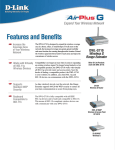Download D-Link DWL-G700AP - AirPlus G Access Point Installation guide
Transcript
TM D-Link AirPlus G DWL-G700AP 2.4GHz Wireless Access Point Manual Version 2.20 Contents Package Contents................................................................................. 3 System Requirements........................................................................... 3 Introduction............................................................................................ 4 Features and Benefits........................................................................... 5 Hardware Overview (LEDs)................................................................... 5 Wireless Basics..................................................................................... 6 Getting Started...................................................................................... 8 Using the Configuration Utility............................................................... 9 Logging into Utility............................................................................ 9 Wireless Settings........................................................................... 10 WEP Encryption..............................................................................11 WPA Authentication........................................................................ 12 WPA-PSK/WPA2-PSK Encryption................................................. 13 LAN Settings.................................................................................. 14 DHCP Configuration....................................................................... 15 Performance Settings.................................................................... 16 MAC Address Filtering................................................................... 17 Change Password.......................................................................... 18 System Backup/Restore................................................................ 18 Firmware Upgrade......................................................................... 19 Device Information......................................................................... 19 System Log.................................................................................... 20 Traffic and Wireless Statistics........................................................ 21 Networking Basics............................................................................... 22 Troubleshooting................................................................................... 35 Package Contents Contents of Package: D-Link AirPlus G DWL-G700AP TM 2.4GHz Wireless Access Point Power Supply Manual on CD Quick Installation Guide Ethernet Cable If any of the above items are missing, please contact your reseller. Note: Using a power supply with a different voltage rating than the one included with the DWL-G700AP will cause damage and void the warranty for this product. System Requirements: Computer with Windows, Macintosh, or Linux-based operating system with an installed Ethernet adapter Internet Explorer or Netscape Navigator version 6.0 or above, with JavaScript enabled Introduction D-Link, an industry leader in networking, introduces the new D-Link AirPlus™ G DWL-G700AP Access Point. With the ability to transfer files with a maximum wireless signal rate of up to 54Mbps*, the DWL-G700AP gives you high-speed wireless network access for your home or office. The DWL-G700AP is Wi-Fi IEEE 802.11g compliant, meaning that it can connect and interoperate with other 802.11g compatible wireless client devices. The G700AP is also backwards compatible to 802.11b. The D-Link DWL-G700AP Access Point has been verified and successfully passed through the Intel Centrino™ Verification Program, which tests the compatibility of various access point devices and wireless service providers with common configuration of notebooks built on Intel® Centrino™ mobile technology**. With its web-based setup wizard, the DWL-G700AP Access Point ensures that you will be up and running on a wireless network in just a matter of minutes. The DWL-G700AP also includes an embedded DHCP server that can automatically assign IP addresses to wireless network clients. The DWL-G700AP Access Point features Wi-Fi Protected Access (WPA-PSK/WPA2-PSK) and 64/128-bit WEP Encryption to provide an enhanced level of security for wireless data communications. The DWL-G700AP also includes additional security features to keep your wireless connection safe from unauthorized access. With easy-to-use Web-based management, the DWL-G700AP Access Point is the right choice for setting up your first wireless network or extending the range of an existing wireless network. * Maximum wireless signal rate based on IEEE Standard 802.11g specifications. Actual data throughput will vary. Network conditions and environmental factors, including volume of network traffic, building materials and construction, and network overhead, lower actual data throughput rate. ** This wireless access point product has been verified for basic compatibility with corresponding Intel® Centrino™ mobile technology based notebooks. Notebooks based on Intel Centrino mobile technology do not support proprietary 802.11g performance enhancement features. Data rate features and performance may vary based on the configuration of your notebook and other factors. Intel, the Intel Inside Logo, Intel Centrino and the Intel Centrino logo are trademarks or registered trademarks of Intel Corporation or its subsidiaries in the United States and other countries. Features and Benefits Up to 5X Faster with AirPlus G Products - high-speed wireless data transfer rates up to 54Mbps*. With increased data rate and capacity, the DWL-G700AP delivers media rich content such as digital images, videos, and MP3 files much faster than standard 802.11b networks. Fully 802.11b Compatible – Fully compatible with the IEEE 802.11b standard and interoperable with all existing 802.11b compliant devices. Network Security – Supports 64/128-bit WEP encryption for a level of security for your data and wireless communication as well as WPA, WPA-PSK and WPA2-PSK. Built-in DHCP Server – If enabled, it will automatically assign IP addresses to wireless clients on the local network. Web-based interface for Managing and Configuring – Easy-to-use interface independent of the operating system. * Maximum wireless signal rate based on IEEE Standard 802.11g specifications. Actual data throughput will vary. Network conditions and environmental factors, including volume of network traffic, building materials and construction, and network overhead lower actual data throughput rate. LEDS LED stands for Light-Emitting Diode. The DWL-G700AP Wireless Access Point has 3 LEDs as shown below: Power: solid green light indicates connection to a power source WLAN: blinking green light indicates wireless activity; solid green light indicates connection LAN: blinking green light indicates activity; solid green light indicates connection Wireless Basics D-Link wireless products are based on industry standards to provide easy-to-use and compatible high-speed wireless connectivity within your home, business or public access wireless networks. D-Link wireless products will allow you access to the data you want, when and where you want it. You will be able to enjoy the freedom that wireless networking brings. A Wireless Local Area Network (WLAN) is a computer network that transmits and receives data with radio signals instead of wires. WLANs are used increasingly in both home and office environments, and public areas such as airports, coffee shops and universities. Innovative ways to utilize WLAN technology are helping people to work and communicate more efficiently. Increased mobility and the absence of cabling and other fixed infrastructure have proven to be beneficial for many users. Wireless users can use the same applications they use on a wired network. Wireless adapter cards used on laptop and desktop systems support the same protocols as Ethernet adapter cards. People use WLAN technology for many different purposes: Mobility - Productivity increases when people have access to data in any location within the operating range of the WLAN. Management decisions based on real-time information can significantly improve worker efficiency. Low Implementation Costs – WLANs are easy to set up, manage, change and relocate. Networks that frequently change can benefit from WLANs ease of implementation. WLANs can operate in locations where installation of wiring may be impractical. Installation and Network Expansion - Installing a WLAN system can be fast and easy and can eliminate the need to pull cable through walls and ceilings. Wireless technology allows the network to go where wires cannot go - even outside the home or office. Scalability – WLANs can be configured in a variety of ways to meet the needs of specific applications and installations. Configurations are easily changed and range from peer-to-peer networks suitable for a small number of users to larger infrastructure networks to accommodate hundreds or thousands of users, depending on the number of wireless devices deployed. Inexpensive Solution - Wireless network devices are as competitively priced as conventional Ethernet network devices. Wireless Basics (continued) Installation Considerations Keep in mind, that the number, thickness and location of walls, ceilings, or other objects that the wireless signals must pass through, may limit the range. Typical ranges vary depending on the types of materials and background RF (radio frequency) noise in your home or business. The key to maximizing wireless range is to follow these basic guidelines: 1 Keep the number of walls and ceilings between the DWL-G700AP and other network devices to a minimum - each wall or ceiling can reduce your DWL-G700AP’s range from 3-90 feet (1-30 meters.) Position your devices so that the number of walls or ceilings is minimized. 2 Be aware of the direct line between network devices. A wall that is 1.5 feet thick (.5 meters), at a 45-degree angle appears to be almost 3 feet (1 meter) thick. At a 2-degree angle it looks over 42 feet (14 meters) thick! Position devices so that the signal will travel straight through a wall or ceiling (instead of at an angle) for better reception. 3 Building materials can impede the wireless signal - a solid metal door or aluminum studs may have a negative effect on range. Try to position wireless devices and computers with wireless adapters so that the signal passes through drywall or open doorways and not other materials. 4 Keep your product away (at least 3-6 feet or 1-2 meters) from electrical devices or appliances that generate RF noise. Getting Started Setting up a Wireless Infrastructure Network 1 2 3 DWL-G700AP 4 6 5 Please remember that D-Link AirPlus G wireless devices are pre-configured to connect together, right out of the box, with their default settings. For a typical wireless setup at home (as shown above), please do the following: You will need broadband Internet access (a Cable or DSL-subscriber line into your home or office) Consult with your Cable or DSL provider for proper installation of the modem Connect the Cable or DSL modem to your broadband router (see the Quick Installation Guide included with your router.) Connect the router to the D-Link AirPlus G DWL-G700AP. (See the Quick Installation Guide included with the DWL-G700AP.) If you are connecting a desktop computer in your network, you can install the D-Link AirPlus G DWL-G510 wireless PCI adapter into an available PCI slot on your desktop computer. (See the Quick Installation Guide included with the DWL-G510.) Install the drivers for the wireless Cardbus adapter into a laptop computer. (e.g, the DWL-G630; See the Quick Installation Guide included with the DWL-G630.) Using the Configuration Utility If you wish to change the default settings or optimize the performance of the DWL-G700AP, D-Link has included a configuration utility for this purpose. After you have completed the initial installation and the Setup Wizard (as illustrated in the Quick Installation Guide that is included with the DWL-G700AP), you can access the configuration menu, at any time, by opening the web-browser and typing in the IP address of the DWL-G700AP. The DWL-G700AP’s default IP address is shown below: Open the web browser Type in the IP address of the DWL-G700AP. (192.168.0.50). Note: If you have changed the default IP address assigned to the DWL-G700AP, make sure to enter the correct IP address. Type admin in the User Name field admin Leave the Password blank Click OK The Home > Wizard s c r e e n w i l l a p p e a r. Please refer to the Quick Installation Guide for more information regarding the Setup Wizard. Using the Configuration Utility (continued) Home > Wireless Mode: Select Access Point mode, AP Client mode or Repeater mode SSID: (Service Set Identifier) Default is the default setting. The SSID is a unique name that identifies a network. All devices on a network must share the same SSID name in order to communicate on the network. If you choose to change the SSID from the default setting, input your new SSID name in this field. Site Survey: If you select the AP Client or Repeater mode, you can click this button to choose the root AP from an available connection list. Channel: Channel 6 is the default channel. Input a new number if you want to change the default setting. All devices on the network must be set to the same channel to communicate on the network. Authentication: Select the level of security for your wireless network: Open System: Select Open System to communicate the key across the network. Shared Key: Select Shared Key to limit communication only to those devices that share the same WEP settings. WPA /WPA2: Select to use WPA (Wi-Fi Protected Access) authentication in conjunction with a RADIUS server. WPA-PSK/WPA2-PSK: Select to use WPA-PSK or WPA2-PSK without a RADIUS server. 10 Using the Configuration Utility (continued) Home > Wireless > WEP WEP:Select Enable or Disable Authentication: Select Open System to communicate the key across the network. Select Shared Key to limit communication only to those devices that share the same WEP settings. WEP Encryption: Select 64-bit or 128-bit WEP encryption. Key Type: Select Hexadecimal or ASCII key type Keys 1-4: Input up to four encryption keys. You will select one of these to be the active key. Apply: Click Apply to apply the changes. Hexadecimal digits consist of the numbers 0-9 and the letters A-F ASCII (American Standard Code for Information Interchange) is a code for representing English letters as numbers from 0-127 11 Using the Configuration Utility (continued) Home > Wireless > WPA/WPA2 Authentication: Select WPA or WPA2. RADIUS Server 1 IP: Enter the IP address of the RADIUS server. Port: Enter the RADIUS port (1812 is default). Shared Secret: Enter the RADIUS passphrase or key. RADIUS Server 2 IP: (Optional) Enter the IP address of a 2nd RADIUS server. Port: Enter the 2nd RADIUS port (1812 is default). Shared Secret: Enter the 2nd RADIUS passphrase or key. Apply: Click Apply to apply the changes. 12 Using the Configuration Utility (continued) Home > Wireless > WPA-PSK/WPA2-PSK Authentication: Select WPA-PSK or WPA2-PSK. Passphrase: Enter your passphrase. The passphrase can be between 8 and 63 characters. Confirm Passphrase: Enter the passphrase again. Apply: Click Apply to apply the changes. 13 Using the Configuration Utility (continued) Home > LAN Dynamic IP Address: Select this option if you would like to have an IP Address automatically assigned to the DWL-G700AP by a DHCP server in your network. DHCP stands for Dynamic Host Configuration Protocol. It is a protocol for assigning dynamic IP addresses “automatically.” With a DHCP Server there is no need to manually assign an IP Address. Static IP Address: Select this option if you are manually assigning an IP Address. IP Address: 192.168.0.50 is the default IP Address of the Access Point. Subnet Mask: 255.255.255.0 is the default Subnet Mask. All devices on the network must have the same subnet mask to communicate on the network. Gateway: Enter the IP Address of the router in your network DNS Server: Enter the IP address of the DNS server. The DNS server translates domain names such as www.dlink.com into IP addresses. IP Address If you need to assign static IP addresses to the devices in your network, please remember that the IP address for each computer or device must be in the same IP address range as all the devices in the network. Each device must also have the same subnet mask. For example: Assign the first computer an IP address of 192.168.0.2 and a subnet mask of 255.255.255.0, the second device an IP address of 192.168.0.3 and a subnet mask of 255.255.255.0, and so on. Note: Devices that are assigned the same IP address may not be visible on the network. 14 Using the Configuration Utility (continued) Home > DHCP DHCP Server: Select Enabled or Disabled. Disabled is the default setting. If you want to use the DWL-G700AP as a DHCP server, to automatically assign dynamic IP addresses on the network, you will select Enabled. Starting IP Address: If you have enabled the DHCP server function, enter the starting point of the IP address range for your network. Ending IP Address: Enter the ending IP address of your IP address range, if you have enabled the DHCP function of the DWL-G700AP. Lease Time: Choose the length of time during which the DHCP function of the DWL-G700AP automatically regenerates the IP addresses to the devices in your network. DHCP Client Table: Lists the devices on your network that are receiving dynamic IP addresses from the DWL-G700AP. 15 Using the Configuration Utility (continued) Beacon Interval: Beacons are Advanced > Performance packets sent by an access point to synchronize a wireless network. Specify a beacon interval value. Default (100) is recommended. RTS Threshold: This value should remain at its default setting of 2,432. If you encounter inconsistent data flow, only minor modifications to the value range between 256 and 2,432 are recommended. Fragmentation: This value should remain at its default setting of 2,346. If you experience a high packet error rate, you may slightly increase your fragmentation threshold within the value range of 256 to 2,346. Setting the fragmentation threshold too low may result in poor performance. DTIM Interval (Beacon Rate): (Delivery Traffic Indication Message) Enter a value between 1 and 255 (default is 3) for the Delivery Traffic Indication Message (DTIM.) A DTIM is a countdown informing clients of the next window for listening to broadcast and multicast messages. TX Rates: Select the transmission rate for the network. Mode Setting: For utmost speed, select G Mode to include only 802.11g devices in your network. Select Mix Mode to include 802.11g and 802.11b devices in your network. Preamble: Long Preamble is the default setting. (High traffic networks should use the shorter preamble type.) The preamble defines the length of the CRC block (Cyclic Redundancy Check is a common technique for detecting data transmission errors) used in communication between the access point and the wireless network adapters. SSID Broadcast: (Service Set Identifier) Enable or Disable (default) the broadcast of the SSID name across the network. SSID is a name that identifies a wireless network. All devices on a network must use the same SSID to establish communication. Antenna Transmit Power: Select the transmission power of the antenna. Limiting antenna power can be useful for security purposes. 16 Using the Configuration Utility (continued) Advanced > Filters DWL-G700AP Use MAC Filters to allow or deny wireless clients, by their MAC addresses, from accessing the DWL-G700AP. You can manually add a MAC address or select the MAC address from the list of clients that are currently connected to the router (Connected PCs). The default setting is Disabled MAC Filters. MAC Filter List: This list will display the MAC addresses that are in the selected filter. 17 Using the Configuration Utility (continued) Tools > Admin New Password: Enter the new password. Confirm Password: Re-enter the password to confirm it. Save Settings: The current Tools > System system settings can be saved as a file onto the local hard drive. Load Settings: The saved file or any other saved setting file can be loaded back on the access point. To reload a system settings file, click on Browse to browse the local hard drive and locate the system file to be used. Click Load when you have selected the file to be loaded back onto the access point. Restore: You may also reset the DWL-G700AP back to factory settings by clicking on Restore. Make sure to save the unit’s settings before clicking on Restore. You will lose your current settings when you click Restore. 18 Using the Configuration Utility (continued) Tools > Firmware You can upgrade the firmware of the DWL-G700AP at this page. When you click Click here to check... in this window you will be connnected to D - L i n k ’s w e b s i t e , where you can download the latest firmware update. After you have completed the firmware download to your hard drive, click Browse to browse your local hard drive and locate the firmware to be used for the update. Click Apply. Status > Device Info This screen displays the current firmware version, and the current wireless and Ethernet settings of the DWL-G700AP. 19 Using the Configuration Utility (continued) Status > Log View Log The DWL-G700AP keeps a running log of events and activities occurring on the AP. If the device is rebooted, the logs are automatically cleared. You may save the log files under Log Setting. First Page - The first page of the log. Last Page - The last page of the log. Previous - Moves back one log page. Next - Moves forward one log page. Clear - Clears the logs completely. Log Settings - Brings up the page to configure the logs. Log Settings Not only does the DWL-G700AP display the logs of activities and events, it can be setup to send these logs to another location. The logs can be sent via email to an email account. 20 Using the Configuration Utility (continued) Status> Stats Traffic Statistics The DWL-G700AP keeps statistics of traffic that passes through it. You are able to view the amount of packets that pass through the Ethernet and wireless portions of the network. The traffic counter will reset if the device is rebooted. DWL-700AP Status > Wireless Connected Wireless PCs List This list displays the MAC Addresses of connected PCs and the length of time that they have been connected. Menu Help Select from this menu for extra help. 21 Networking Basics Using the Network Setup Wizard in Windows XP In this section you will learn how to establish a network at home or work, using Microsoft Windows XP. Note: Please refer to websites such as http://www.homenethelp.com and http://www. microsoft.com/windows2000 for information about networking computers using Windows 2000. Go to Start>Control Panel>Network Connections Select Set up a home or small office network When this screen appears, click Next. 22 Networking Basics (continued) Please follow all the instructions in this window: Click Next. In the following window, select the best description of your computer. If your computer connects to the internet through a gateway/router, select the second option as shown. Click Next. 23 Networking Basics (continued) Enter a Computer description and a Computer name (optional.) Click Next. Enter a Workgroup name. All computers on your network should have the same Workgroup name. Click Next. 24 Networking Basics (continued) Please wait while the Network Setup Wizard applies the changes. When the changes are complete, click Next. Please wait while the Network Setup Wizard configures the computer. This may take a few minutes. 25 Networking Basics (continued) In the window below, select the option that fits your needs. In this example, Create a Network Setup Disk has been selected. You will run this disk on each of the computers on your network. Click Next. Insert a disk into the Floppy Disk Drive, in this case drive A. 26 Networking Basics (continued) Please read the information under Here’s how in the screen below. After you complete the Network Setup Wizard you will use the Network Setup Disk to run the Network Setup Wizard once on each of the computers on your network. To continue click Next. 27 Networking Basics (continued) Please read the information on this screen, then click Finish to complete the Network Setup Wizard. The new settings will take effect when you restart the computer. Click Yes to restart the computer. You have completed configuring this computer. Next, you will need to run the Network Setup Disk on all the other computers on your network. After running the Network Setup Disk on all your computers, your new wireless network will be ready to use. 28 Networking Basics (continued) Naming your Computer To name your computer in Windows XP, please follow these directions: ClickStart (in the lower left corner of the screen). Right-click on My Computer. Select Properties and click. Select the Computer Name Tab in the System Properties window. enter a Computer You may Description if you wish; this field is optional. To rename the computer and join a domain, Click Change. 29 Networking Basics (continued) Naming your Computer In this window, enter the Computer name. Select Workgroup and enter the name of the Workgroup. omputers on your A l l c network must have the same Workgroup name. Click OK. Checking the IP Address in Windows XP The wireless adapter-equipped computers in your network must be in the same IP Address range (see Getting Started in this manual for a definition of IP Address Range.) To check on the IP Address of the adapter, please do the following: Right-click on the Local Area Connection icon in the task bar. Click on Status. 30 Networking Basics (continued) Checking the IP Address in Windows XP This window will appear. Click the Support tab. Click Close. Assigning a Static IP Address in Windows XP/2000 Note: Residential Gateways/Broadband Routers will automatically assign IP Addresses to the computers on the network, using DHCP (Dynamic Host Configuration Protocol) technology. If you are using a DHCP-capable Gateway/ Router you will not need to assign Static IP Addresses. If you are not using a DHCP capable Gateway/Router, or you need to assign a Static IP Address, please follow these instructions: Goto Start. on Double-click Control Panel. 31 Networking Basics (continued) Assigning a Static IP Address in Windows XP/2000 Double-click on Network Connections. Right-click on Local Area Connections. on Double-click Properties. 32 Networking Basics (continued) Assigning a Static IP Address in Windows XP/2000 Click on Internet Protocol Click Properties. (TCP/IP). In the window below, select Use the following IP address. Input your IP address and subnet mask. (The IP addresses on your network must be within the same range. For example, if one computer has an IP address of 192.168.0.2, the other computers should have IP addresses that are sequential, like 192.168.0.3 and 192.168.0.4. The subnet mask must be the same for all the computers on the network.) IP Address: e.g., 192.168.0.2 Subnet Mask: 255.255.255.0 Default Gateway: Enter the LAN IP address of the wireless router. (D-Link wireless routers have a LAN IP address of 192.168.0.1) Select Use the following DNS server address. Enter the LAN IP address of the wireless router. (D-Link wireless routers have a LAN IP address of 192.168.0.1) Click OK. You have completed the assignment of a static IP address. (You do not need to assign a static IP address if you have a DHCP-capable router.) 33 Networking Basics (continued) Checking the Wireless Connection by Pinging in Windows XP/2000 to Start > Run > Go type cmd. A window similar to this one will appear. Type ping xxx.xxx.xxx. xxx, where xxx is the IP address of the wireless router or access point. A good wireless connection will show four replies from the wireless router or access point, as shown. Checking the Wireless Connection by Pinging in Windows Me /98SE to Start > Run Go > type command. A window similar to this will appear. Type ping xxx.xxx. xxx.xxx where xxx is the IP address of the wireless router or access point. A good wireless connection will show four replies from the wireless router or access point, as shown. 34 Troubleshooting This chapter provides solutions to problems that can occur during the installation and operation of the DWL-G700AP. We cover various aspects of the network including network adapters. (The examples below are illustrated in Windows XP. If you have another operating system, these solutions will still apply, although the appearance on your computer screen may differ.) Note: It is recommended that you use an Ethernet connection to configure the DWL-G700AP Access Point. 1. The computer used to configure the DWL-G700AP cannot access the configuration menu. Check that the Ethernet LED on the DWL-G700AP is ON. If the LED is not ON, check that the cable for the Ethernet connection is securely inserted. Check that the Ethernet adapter is working properly. Please see item 3 (Check that the drivers for the network adapters are installed properly) in this Troubleshooting section to check that the drivers are loaded properly. Check that the IP address is in the same range and subnet as the DWL-G700AP. Please see Checking the IP Address in Windows XP in the Networking Basics section of this manual. Note: The IP address of the DWL-G700AP is 192.168.0.50. All the computers on the network must have a unique IP address in the same range, e.g., 192.168.0.x. Any computers that have identical IP addresses will not be visible on the network. They must all have the same subnet mask, e.g., 255.255.255.0 Do a Ping test to make sure that the DWL-G700AP is responding. Go to Start>Run>Type Command>Type ping 192.168.0.50. A successful ping will show four replies. 35 Troubleshooting (continued) 2. The wireless client cannot access the Internet in the Infrastructure mode. Make sure the wireless client is associated and joined with the correct access point (DWL-G700AP). To check this connection: Right-click on the Local Area Connection icon in the taskbar> select View Available Wireless Networks. The Connect to Wireless Network screen will appear. Please make sure you have selected the correct available network, as shown in the illustrations below. Note: Screen shots were taken using Windows XP. Your screens may differ. Check that the IP address assigned to the wireless adapter is within the same IP address range as the access point and gateway. Since the DWL-700AP has an IP address of 192.168.0.50, wireless adapters must have an IP address in the same range, e.g., 192.168.0.x. Each device must have a unique IP address; no two devices may have the same IP address. The subnet mask must be the same for all the computers on the network. To check the IP address assigned to the wireless adapter, double-click on the Local Area Connection icon in the taskbar > select the Support tab and the IP address will be displayed. (Please refer to Checking the IP Address in the Networking Basics section of this manual.) If it is necessary to assign a static IP address to the wireless adapter, please refer to the appropriate section in Networking Basics. If you are entering a DNS Server address you must also enter the Default Gateway Address. (Remember that if you have a DHCP-capable router, you will not need to assign a static IP address. See Networking Basics: Assigning a Static IP Address.) 36 Troubleshooting (continued) 3. Check that the drivers for the network adapters are installed properly. You may be using different network adapters than those illustrated here, but this procedure will remain the same, regardless of the type of network adapters you are using. Go to Start Right-click on My Computer Click Properties Select the Hardware Tab Click Device Manager 37 Troubleshooting (continued) Double-click on Network Adapters Right-click on D-Link Air DWL-650 Wireless Cardbus Adapter (or whatever network adapter you are using) Select Properties to check that the drivers are installed properly Look under Device Status to check that the device is working properly. Click OK 38 Troubleshooting (continued) 4. Resetting the DWL-G700AP to Factory Default Settings After you have tried other methods for troubleshooting your network, you may choose to Reset the DWL-G700AP to the factory default settings. Remember that D-Link AirPlus G products network together, out of the box, at the factory default settings. To hard-reset the D-Link AirPlus G DWL-G700AP to Factory Default Settings, please do the following: Locate the Reset button on the back of the DWL-G700AP Use a paper clip to press the Reset button Hold for about 5 seconds and then release After the DWL-G700AP reboots (this may take a few minutes) it will be reset to the factory default settings. 39
















































